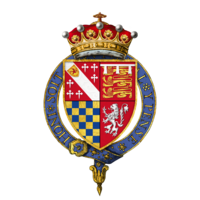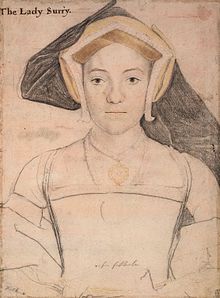music.wikisort.org - Poet
Henry Howard, Earl of Surrey (1516/1517 – 19 January 1547), KG, was an English nobleman, politician and poet. He was one of the founders of English Renaissance poetry and was the last known person executed at the instance of King Henry VIII. He was a first cousin of both Queen Anne Boleyn and Queen Catherine Howard, second and fifth wives of King Henry VIII. His name is usually associated in literature with that of the poet Sir Thomas Wyatt. He was the son of Thomas Howard, Earl of Surrey, and when his father became Duke of Norfolk (1524) the son adopted the courtesy title of Earl of Surrey. Owing largely to the powerful position of his father, Howard took a prominent part in the court life of the time, and served as a soldier both in France and Scotland. He was a man of reckless temper, which involved him in many quarrels, and finally brought upon him the wrath of the ageing and embittered Henry VIII. He was arrested, tried for treason and beheaded on Tower Hill.
Henry Howard | |
|---|---|
| Earl of Surrey | |
 A painting of Surrey in 1546 controversially showing the arms of his royal ancestors Edward II (left) and Edward III (right) | |
| Coat of arms |  Arms of Henry Howard, Earl of Surrey, KG |
| Born | c. 1517 Hunsdon, Hertfordshire |
| Died | 19 January 1547 (aged 29–30) Tower Hill, Tower of London, London |
| Buried | Church of St Michael the Archangel, Framlingham, Suffolk |
| Noble family | Howard |
| Spouse(s) | Frances de Vere |
| Issue | Thomas Howard, 4th Duke of Norfolk Henry Howard, 1st Earl of Northampton Jane Howard, Countess of Westmorland Catherine Howard, Lady Berkeley Margaret Howard, Lady Scrope |
| Father | Thomas Howard, 3rd Duke of Norfolk |
| Mother | Lady Elizabeth Stafford |
Origins
He was born in Hunsdon, Hertfordshire,[1] the eldest son of Thomas Howard, 3rd Duke of Norfolk, by his second wife Elizabeth Stafford, a daughter of Edward Stafford, 3rd Duke of Buckingham. He was thus descended from King Edward I on his father's side and from King Edward III on his mother's side.
Career
He was brought up at Windsor Castle with Henry FitzRoy, 1st Duke of Richmond and Somerset, the illegitimate son of King Henry VIII. He became a close friend, and later a brother-in-law, of Fitzroy following the marriage of his sister to him.[2] Like his father and grandfather, he was a soldier, serving in Henry VIII's French wars as Lieutenant General of the King on Sea and Land.
He was repeatedly imprisoned for rash behaviour: on one occasion for striking a courtier and on another for wandering through the streets of London breaking the windows of houses whose occupants were asleep.[2] He assumed the courtesy title Earl of Surrey in 1524 when his grandfather died and his father became Duke of Norfolk.[3]
In 1532 he accompanied Anne Boleyn (his first cousin), King Henry VIII, and the Duke of Richmond to France, staying there for more than a year as a member of the entourage of King Francis I of France. 1536 was a notable year for Howard: his first son was born, namely Thomas Howard (later 4th Duke of Norfolk), Anne Boleyn was executed on charges of adultery and treason, and the Duke of Richmond died at the age of 17 and was buried at Thetford Abbey, one of the Howard seats. In 1536 Howard also served with his father in the suppression of the Pilgrimage of Grace, a rebellion against the Dissolution of the Monasteries.[3]
Marriage and progeny

He married Frances de Vere, a daughter of John de Vere, 15th Earl of Oxford,[1] (by his wife Elizabeth Trussell) by whom he had two sons and three daughters:
- Thomas Howard, 4th Duke of Norfolk (10 March 1536 – 2 June 1572), who married three times: (1) Mary FitzAlan (2) Margaret Audley (3) Elizabeth Leyburne.
- Henry Howard, 1st Earl of Northampton, who died unmarried.
- Jane Howard, who married Charles Neville, 6th Earl of Westmorland.
- Katherine Howard, who married Henry Berkeley, 7th Baron Berkeley.
- Margaret Howard, who married Henry Scrope, 9th Baron Scrope of Bolton. She was born after her father’s execution.[4]

Downfall
![The arms for which Howard was attainted (Edward the Confessor's arms are in the fifth quarter with a label of three points plain Argent).[5]](http://upload.wikimedia.org/wikipedia/commons/thumb/3/3a/Howard%2C_Earle_of_Surrey%2C_for_which_he_was_attainted.svg/170px-Howard%2C_Earle_of_Surrey%2C_for_which_he_was_attainted.svg.png)
The Howards had little regard for the "new men" who had risen to power at court, such as Thomas Cromwell and the Seymours. Howard was less circumspect than his father in concealing his disdain. The Howards had many enemies at court.[6] Howard himself branded Cromwell a 'foul churl' and William Paget a 'mean creature' as well as arguing that 'These new erected men would by their wills leave no nobleman on life!'[7]
Henry VIII, consumed by paranoia and increasing illness, became convinced that Howard had planned to usurp the crown from his son the future King Edward VI. Howard suggested that his sister Mary FitzRoy, Duchess of Richmond and Somerset (widow of Henry's illegitimate son Henry Fitzroy) should seduce the aged King, her father-in-law, and become his mistress, to "wield as much influence on him as Madame d'Etampes doth about the French King". The Duchess, outraged, said she would "cut her own throat" rather than "consent to such villainy".[8] She and her brother fell out, and she later laid testimony against Howard that helped lead to his trial and execution for treason. The matter came to a head when Howard quartered the attributed arms of King Edward the Confessor. John Barlow had once called Howard "the most foolish proud boy that is in England" and, although the arms of Howard's ancestor Thomas Mowbray, 1st Duke of Norfolk, show that he was entitled to bear Edward the Confessor's arms, doing so was an act of pride.[9] In consequence, the King ordered Howard's imprisonment and that of his father, sentencing them to death on 13 January 1547. Howard was beheaded on 19 January 1547[10] on a charge of treasonably quartering the royal arms. His father escaped execution as the king died the day before that appointed for the beheading, but he remained imprisoned. Howard's son Thomas Howard, became heir to the Dukedom of Norfolk in place of his father, which title he inherited on the 3rd Duke's death in 1554.
Burial

He was buried in Framlingham Church in Suffolk, where survives his spectacular painted alabaster tomb.
Literary activity and legacy
He and his friend Sir Thomas Wyatt were the first English poets to write in the sonnet form that Shakespeare later used, and Howard was the first English poet to publish blank verse (unrhymed iambic pentameter) in his translation of the second and fourth books of Virgil's Aeneid. Together, Wyatt and Howard, due to their excellent translations of Petrarch's sonnets, are known as "Fathers of the English Sonnet". While Wyatt introduced the sonnet into English, it was Howard who gave them the rhyming meter and the division into quatrains that now characterises the sonnets variously named English, Elizabethan, or Shakespearean sonnets.[11][12]
In popular culture
Henry Howard, Earl of Surrey was portrayed by the actor David O'Hara in The Tudors, a television series which ran from 2007 to 2010.[13]
References
- "Henry Howard, Earl of Surrey", Poetry Foundation
- The Norton Anthology of English Literature: Sixteenth/Early Seventeenth Century, Volume B, 2012, pg. 661
- Chisholm, Hugh, ed. (1911). . Encyclopædia Britannica (11th ed.). Cambridge University Press.
- William A. Sessions (2003). Henry Howard, the Poet Earl of Surrey: A Life. Oxford University Press. pp. 202–. ISBN 978-0-19-818625-0.
- Childs, Jessie (2007). Henry VIII's last victim : the life and times of Henry Howard, Earl of Surrey. New York: Thomas Dunne Books/St. Martin's Press. p. plate 35. ISBN 978-0-312-37281-1. OCLC 141386430.
- Childs 2007.
- Childs 2007, p. 1.
- Hart, Kelly (1 June 2009). The Mistresses of Henry VIII (First ed.). The History Press. pp. 194–197. ISBN 978-0-7524-4835-0.
- The Heraldic Charge Against the Earl of Surrey, Peter R. Moore, English Historical Review, Volume CXVI, pages 557 to 583, (2001).
- "Earl of Surrey Henry Howard", A Dictionary of British History, (John Cannon, ed.), OUP, 2009 ISBN 9780199550371
- The Shakespearean Sonnet
- Sonnets
- "Cast: Henry Howard, Earl of Surrey". The Tudors. Canadian Broadcasting Corporation. Retrieved 2 January 2015.
Further reading
- Hutchinson, Robert (2009). House of Treason: the Rise and Fall of a Tudor Dynasty.
- Williams, Neville (1989). A Tudor Tragedy: Thomas Howard, Duke of Norfolk.
- Head, David M. (1995). The Ebbs and Flows of Fortune: Life of Thomas Howard, the Duke of Norfolk.
- Lee, Sidney (1891). . In Lee, Sidney (ed.). Dictionary of National Biography. Vol. 28. London: Smith, Elder & Co. pp. 23–28.
- Keene, Dennis (ed.). Selected Poems by Henry Howard, Earl of Surrey. Fyfield Books.
- Yeowell, James, ed. (1908). The Poems of Henry Howard, Earl of Surrey.—with a memoir by the editor
- Brigden, Susan. "Howard, Henry, earl of Surrey (1516/17–1547)". Oxford Dictionary of National Biography (online ed.). Oxford University Press. doi:10.1093/ref:odnb/13905. (Subscription or UK public library membership required.)
External links
Henry Howard, Earl of Surrey
- Works by or about Henry Howard, Earl of Surrey at Internet Archive
- Works by Henry Howard, Earl of Surrey at LibriVox (public domain audiobooks)

- "Complaint of the Absence of Her Lover Being upon the Sea" set to music From the 1990 concept album "Tyger and Other Tales”
На других языках
- [en] Henry Howard, Earl of Surrey
[es] Henry Howard
Henry Howard, conde de Surrey (1517 - 19 de enero de 1547) fue un aristócrata inglés, y uno de los fundadores de la poesía renacentista inglesa.[fr] Henry Howard (comte de Surrey)
Henry Howard, chevalier de la Jarretière (1516 ou 1517 – 19 janvier 1547), connu, en tant que poète, sous le surnom de « comte de Surrey », bien qu'il n'ait jamais été pair, est un soldat et aristocrate anglais, l’un des pères de la poésie anglaise de la Renaissance.[ru] Говард, Генри, граф Суррей
Генри Говард, граф Суррей (англ. Henry Howard, Earl of Surrey; ок. 1517 — 19 января 1547) — английский аристократ, один из основателей английской поэзии эпохи Возрождения.Другой контент может иметь иную лицензию. Перед использованием материалов сайта WikiSort.org внимательно изучите правила лицензирования конкретных элементов наполнения сайта.
WikiSort.org - проект по пересортировке и дополнению контента Википедии